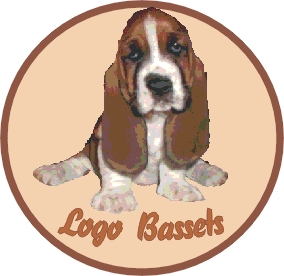

There is much controversy in the Basset world as to whether you own a Basset, or if the Basset owns you. It is not unusual for a family to refer to themselves as the "food slaves" or "petting machines" when discussing the care of their Basset. Knowing this, the question boils down to: "Are you the right person/s to become a family member and caretaker of this very special breed?"
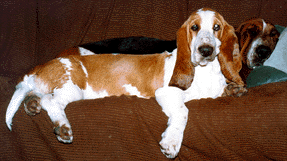
Bassets are funny to watch, love to snuggle, have the patience of Job (unless food is involved), and love life in general. They adore their naps but love a good romp where there are smells to smell and places to go. Unlike the sporting dogs, Bassets were originally bred for hunting in the field, tracking the scent ahead of the hunter and often working in packs.Because of this, they are thinkers, therefore an independent minded sort of dog. Yet at the same time, they are very dependent upon being an accepted and valued member of the family. They bond tightly to their "pack", and because of this you need to be sure you are making a life-long commitment to ownership before acquiring one.
Much of the media has portrayed the Basset as a lounge lizard, a dog that lies around with nothing to do. This is not an accurate view of the Basset Hound. Young Bassets are very active, busy with life and ready to jump into action. They do slow down as they get older, but will still need stimulation to keep them physically and emotionally sound. They can tolerate long periods of inaction, but must have interaction. In order to maintain sound health and condition, they need exercise, good nutrition and special time with their humans.
Basset Hounds can bulldoze through a wimpy fence; bark as loud as a giant breed; can be as playful as a kitten; and can be more fun to watch than your favorite comedy.
Bassets are good family dogs if they come from ancestry of good temperaments. They generally love all types of humans and other animals. A friendly Basset can be pushy about making friends. Their desire to be social with others should be watched, as the Basset does not understand that other animals may not love Bassets!
More and more rescue groups are seeing shy, mean and/or destructive dogs from breeders whose purpose is to breed for profit. A reputable breeder will breed for physical and mental soundness. Unfortunately, not all "breeders" are reputable or knowledgeable persons. AKC papers are not a guarantee. AKC does not regulate quality breeding - they just process paperwork.
It is NOT recommended to acquire a Basset when you have young children. These dogs are not ballerinas and will accidentally knock over a child. Puppies will nip at babies while teething, will test their limits in the relationship and get shy about handling if a baby or toddler has inadvertently mishandled them. Puppies will also grow quicker than babies and will overpower a young child with their youthful exuberance and desire to find their "place" within the pack.
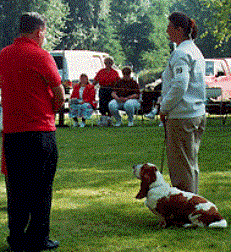
Bassets CAN be trained. They were bred for independent thought while hunting, so may be slow to respond to human requests. This does not mean they are stubborn, stupid or disrespectful - they are actually thinking things over. When choosing what you might allow that cute Basset to do, remember a breed quality is that "yes" will likely be interpreted by your dog as applying forever.
It is much easier to train a thinking dog than it is to re-train one. Bassets have a brain and will find ways and "looks" to try to make things happen to their best advantage (just like a kid). If you choose a Basset as your breed, you must start training as soon as the dog comes home.
Many breeders and owners prefer the use of a spray bottle filled with water for all kinds of training around the house. It allows you to get the dog's attention in a humane manner and will not harm most household items. It also keeps down the risk of your dog learning to be hand shy or to run away from its owners when called or chased, because it won't associate human touch with being scolded. I recommend that all Basset owners take a basic obedience course (let the dog go too!) as it will help you to better understand how your dog thinks and responds, and how you should respond to your dog. It will also help give you that very special bond that makes you both more consistent when responding to each other.
Bassets will wander off if they are not on a leash or behind a fence. If tied out or chained, a Basset is miserable and your neighbors will hear about it. Their outside area should have shelter for the dog to stay dry and warm. Bassets rarely return if they get loose or are free to roam. They do not look up when on a scent trail and think all hazards will avoid them so they need not bother to check if they are safe. Bassets generally will go until they are too exhausted to go on, then look around for a free meal. If you want your dog to have more freedom, get a long flexi-lead for walks. An improperly contained Basset is a rescue dog waiting to happen, if it lives through the experience. If you cannot, or will not fence an area, DO NOT get a Basset hound.
Though all dogs need lots of fresh water to drink and your Basset will drool because of loose flews, a Basset has trouble handling any amount of water larger than will fit into a bucket. Built of heavy bone and muscle, they would have made great submarines, but do not have the required gills to survive. Though they can swim, they will not make the Olympic team and have extreme difficulty using those short legs to get out of liquid situations. Keep a secure fence between your Basset and any body of water deeper than they can wade through all year round.
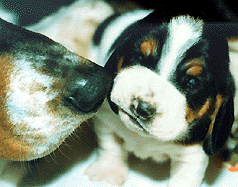 Health Concerns
Health ConcernsWhile some unscrupulous breeders will tell you that the Basset breed has no health concerns or hereditary tendencies, there ARE some specific problems that can crop up. Some are hereditary in nature, others specific to body type. Though most Bassets go through life without any of these problems, it is wise to know of them in case they should manifest themselves.
Basset puppies grow very quickly; and as with other heavy-boned breeds, they are prone to Panosteitis, which is often referred to as "long bone" or Pano. With Pano the bones and tissues in the legs do not grow at the same rate, thus the dog may limp due to tearing. It does take care of itself with time, though dogs with active Pano may need an anti-inflammatory, and can be prone to arthritis in the joints as they age. Veterinarians have been known to misdiagnose this problem and do unnecessary surgery. There is much information about Pano on the web. I have found the URL http://www.critterhaven.org/critterchat/pano.htm to be very informative.
Bassets as a breed are prone to ear infections (see ears) and to arthritis. Many people choose to build ramps to alleviate stress on the back and joints since the Bassets' short-legged bone structure is such that they can find stairs and furniture difficult to navigate. Most Bassets also need their anal glands expressed routinely to avoid impaction or infection.
Several other problems can be seen infrequently in the breed. These include Glaucoma, bleeding disorders, Entropion, Bloat/Gastric Torsion and Patellar Luxation. An informative web site for Basset-specific health information is URL http://www.Basset.net/vet.html
I must emphasize that reputable breeders are knowledgeable about these problems and have done their best to try to ensure that these are not bred into their dogs. They will be able and willing to share information about the testing done and the health history of the dogs they have bred or bred to. I would be wary of any breeder that cannot or will not fully discuss this with you.
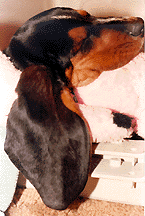 Coat Grooming
Coat GroomingBassets have a "musky" odor, as all scent hounds do. This means that your Basset will smell "doggy". It is because they have oils in their coat to help keep the loose skin flexible, and to help the water run off when working in the field. Nutrition can play a part in how much odor your dog may have, but if you are looking for a sweet-smelling breed, the scent hound family is not for you.
Luckily the Basset is a "wash-and-wear" breed and can be bathed as often as you wish using a shampoo intended for dogs. If you brush your Basset daily (gently with a slicker brush works nicely) it will cut down on odor (thus the number of needed baths) and the amount of shed hair you will find around the house.
Toenails
Bassets need to have their toenails kept short. This is especially important in this short-legged, heavy boned breed as more pressure is asserted on the toes due to their body structure. Longer nails cause soreness in the toes and can cause the toes to splay (spread out) or the nails can grow into the pads. To keep your dog free from this discomfort, purchase a large dog nail clipper and clip near (but not into) the "quick" (the pink area). Ideally, this should be done weekly, but no less than once a month.
Ears
When you have long ears that lay on the side of your head, you do not get any air passing by to keep your ears dry. This also means a Basset's ears become a trap for dirt that can enter, but not escape. Ears need to be cleaned/wiped out weekly to prevent infection.
Many vets make a good living on Bassets that have had poor ear care. Bassets can get bacterial or yeast infections easily when the ears are neglected. There are many good ear cleaners on the open market that will work. Please consult your vet or breeder for one they recommend.
Muzzle and Eye Area
Dirty faces abound when your nose is on the ground! Wash the face with lukewarm water several times a week and your dog will have less opportunity for "gunk" to accumulate and migrate into its eyes. Dogs in multiple-dog homes will often do this for each other, but they use their tongue since most don't have a washcloth of their own.
Teeth
Bassets generally have heavy flews and food easily gets trapped in the gums or between the heavy teeth. Dogs rarely get cavities, but they can easily get gum disease and infections. Ideally, teeth will be brushed daily with dog toothpaste. They should be brushed at least weekly and scaling should be done by the vet as needed, or you can buy a scaler and seek training from your veterinarian or a knowledgeable breeder on how to do it yourself.
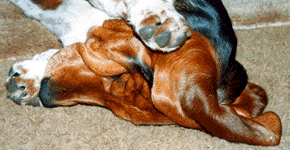
There are many quality foods and diet recommendations. Opinions will vary as to which is best for your Basset; some will recommend a commercial kibble product, some a fresh food diet, others a combination thereof. All will agree that if you are feeding commercial kibble, using a generic brand is deadly. Your breeder or vet can recommend a food that will be healthy and balanced for your dog. Remember, you often get what you pay for money saved on cheap dog food will be lost in vet bills for eventual health problems.
If your dog has what you consider an excessive hound odor or a chronic ear or skin problem, you should consult your breeder or vet about a possible food change as it may help.
With kibble products, most adults eat two to six cups per day depending on their age, activity level and the quality of the food they are given. Puppies will often eat considerably more and more because they grow so rapidly. Bassets often do well on dry food; but many breeders and vets recommend that you soak it in a bit of warm water before offering it to prevent choking and to reduce the risk of bloat.
There is a lot of controversy as to whether or not Basset puppies should befed a high protein food or puppy chow. High protein foods tend towards faster growth and Pano, a "fast growth" related problem; so it can be a problem with Bassets who grow so quickly.
Fussy eaters are not born, they are created. Offer food once or twice a day, if it is not eaten in about 15 minutes take it up and do not offer it again until the next scheduled feeding time. If feeding table scraps with the meal, remember to count them as PART of the meal. If not included in the whole nutritional picture, they can create a fat dog quickly, can cause a dog to become a beggar, a scrounger (including from counter tops!) or a dreaded fussy eater.
Weight
Bassets are short dogs, but NOT small dogs. Do not expect that cute little puppy to always be a little lap dog. Bassets do have a tendency to get overweight if fed too much. This is very harmful to the health of these dogs because they are a dwarfed breed, and the bone structure does not tolerate excessive poundage. Please be kind to your dog and keep it at a good healthy weight.
How much should your dog weigh you ask? Many books and vet offices have inaccurate information on this. Weight depends on the basic size and structure of the dog. The smaller-boned Bassets or those of smaller stature may range from 40-50 pounds. Heavier-boned dogs of greater overall stature may be 50-75 pounds. Some European imports can be as much as 80-100 pounds and still be in good weight; but these are rarely seen in the USA. Basically, the ribs should be easily felt, but not obviously seen as protruding. Again, ask your veterinarian, a Basset rescue contact, or a breeder as to what may be the proper weight for your dog to maintain and still remain in good condition.
The "LOOK"
Honestly, many Basset owners feel their dogs go to the mirror, when we are not around, to practice the pathetic looks they can give you to look "starved". Do not fall for "the look", you are dealing with experts on this. Just because your Basset gives you a look that appears as if it is starving, it does not mean it is hungry. But, you say, he did eat with GUSTO when I fed him. Of course he did. Bassets love to eat even when they are full. BEWARE OF "THE LOOK
Treats
Keep in mind that all treats are calories in addition to meals, so feeding should be adjusted according to how often you fall for "The Look". There is controversy about some types of treats including rawhide, cow hooves, pigs ears, etc. The problem is based on product content, quality control, possible chemical contamination (what did that animal die of?), choking, and splintering possibilities.
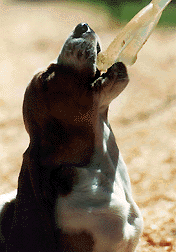 Some breeders will
only give the compressed rawhide treats, and only those made in
the USA, Canada, or England. Some will offer other products but
only under close supervision (knuckle bones, Gumabone products,
especially plaque attackers) and some give biscuits only. NEVER
give your dog any type of bone that can splinter! (especially
cooked chicken, turkey, pork, and ribs.)
Some breeders will
only give the compressed rawhide treats, and only those made in
the USA, Canada, or England. Some will offer other products but
only under close supervision (knuckle bones, Gumabone products,
especially plaque attackers) and some give biscuits only. NEVER
give your dog any type of bone that can splinter! (especially
cooked chicken, turkey, pork, and ribs.)
Hard dog biscuits are great for their teeth as they can help slow plaque build up. Many easy and healthy recipes are available so you can cook up your own! Breeders who feed a raw diet will include raw chicken wings to keep the teeth clean.
To control calories, many people use the smaller kinds of dog "cookies", sometimes breaking them in half. Bassets are often fond of fruits and vegetables which are cheap, safe and not controversial. They are low in calories, but still need to be given in moderation.
A Basset does not know, nor care how big the treat is, just that it got one or two or three. They do prefer quantity to size, so you can play with this.
All AKC recognized breeds of dogs have a "mother" breed club. The BHCA has a great website URL http://www.Basset-bhca.org/Bhcaweb/
BHCA also sponsors BHCares, which is a support group for Basset hound rescue organizations throughout the USA. Their website can help you find local Basset rescue groups - URL http://www.idis.com/target/Basset/
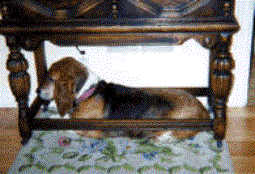
These are some of the games most Bassets play. They are creative dogs and will find ones that you may never have thought of, or wanted to consider. It is important that you take the lead and show your Basset which games are acceptable in your household. Of course, not all Bassets play every game and these are not the only games Bassets will play, but owners agree that these are the most frequent. It is equally important that when reading about the games they often choose, if you consider most of these games as problematic in your home, the choice of having a Basset could be problematic as well.
Bassets are unusual dogs in that the games they play and rules they follow are not "politically correct" according to dogs of other breeds. This is because they are independent thinkers and will choose how to vary the game to their advantage.
For example: An Afghan Hound (a very fast breed) will run the fence perimeter in a game of chase and have a home base; while a Basset takes the shortest distance between two points and will not respect the "home free" space. This allows the Basset to get to the end point just when the Afghan arrives, much to the surprise of the Afghan. The poor Afghan then believes it has been outrun by a dog with no legs and the Basset is feeling ever so powerful and clever, and announces this loudly to the Afghan.
This delights the true Basset owner and frustrates those that likely should not have a Basset in their life. Basset owners are full of incredible true tales of how their dogs "find" fun.
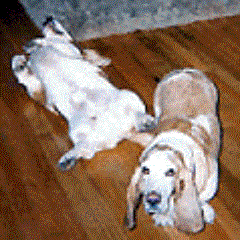
Fast Dog: This game involves running as fast as your mini legs will carry you, holding your head in ear-flying position. When engaging in this activity, the Basset believes it is running like the wind, faster than a speeding bullet and no one/nothing can keep up with it. A true Basset lover will not proceed beyond a jog, so that the dog's spirit will not be crushed and its ego can maintain the pride of being the "fastest dog on the planet". This game is often played after he has had a bath, when he is chasing chickens and birds on the beach, or when he leaves with your Burger King Whopper that you so kindly left unattended.
Stereo Chase: In this game, there are other dogs involved. One dog is "it", the others semi-chase it until it tires and sits or lays for a rest. All the Bassets involved then take position around the "it" and bark until "it" can stand it no more and will run again. This is repeated over and over until someone else chooses to become "it" or the current "it" loses patience and/or screams uncle or simply goes deaf from the onslaught.
Hide and Seek: Not all Bassets play this. It will often be a game with a human. The human hides somewhere in the house and the Basset has to "go find". It can also take the form of hiding around the kitchen island, the around-and-about section of the house, or around the shed outside, etc. I must admit to having been found sitting on my kitchen counter looking down upon my hounds while they try to scent the trail and find me.
Bite the Leg: (played only with other dogs): When you are a dog with no legs and what little you have is resting under your body, this is a very challenging game. Trying to nip each others leg while standing is the hardversion. Lying down and nibbling on the other guy's leg is the most common form however.
Bite the Face (played
only with other dogs): This game involves
lots of open-mouthed "gumming", trying to trap the other
guys muzzle in one's mouth. This is not a tough challenge, but
will do when too tired to play Bite the
Leg. When they go for the ears, this game needs to be halted as
it can lead to hard feelings and loud squeals.
Fetch: With a few rare exceptions, this is not a very fun
game with a Basset unless you like to jog. Most take the attitude
of, "You didn't want it, so you threw it away. Why should
I go get it just because you changed your
mind?"
Flat Basset: This is a game your Basset will choose to play spontaneously...generally
at bath time, when you want them to move over, or just move for
that matter. It involves the Basset flattening itself onto the
floor, often with legs spread out. The dog no longer weighs its
original weight, but thousands of pounds and is virtually immovable.
Suggestions for winning this
game may include using a crowbar, renting a back loader, or a
crane.
Towel Toss: Some Bassets use towels, others afghans (the blanket kind, not the hound type), or a small blanket. They may hide under it, walk around the house with it on them, peek through it or even toss it about the room.
Tug-O-War: Played with a towel, a rope toy or your laundry. It is not suggested to play this with items you wish them to use occasionally, nor with a young dog that is still developing his correct bite/jaw line.
Kill the Squeaker: When you buy or make a toy, be aware that most Bassets will focus on the squeaker as an item to be removed. It is not the squeak, but the challenged of removal. The same goes for stuffies that have eyes or noses. Most Basset owners find latex and plastic toys a waste of money due to the "removal factor".
Eat the Underwear: Bassets tend to have an undying fascination for underwear and socks, especially if they have been worn. Beware where you leave them or they will be air-conditioned!
Slug: In this game, your Basset becomes very slow to go or do what you would like. You may wonder if the dog is ill. A once "fast Basset" is now painfully sluggish unless food is offered to enhance the speed of operation.
Bumper Arm: This is when you have a Basset that is insistent on getting pats, or more pats NOW. Your arm or elbow will be elevated to new heights with no consideration to what may be in your hand or what your arm may touch, other than the Basset itself.
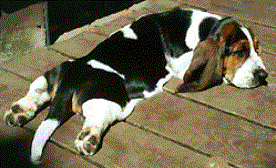 Sun Bunny:
Sunny sidewalks, decks and patios draw packs of Bassets, all happily
resting on their sides, or on their backs, legs spread and exposing
their BRA (Basset Reproductive Apparatus) to the world. Human
companions who need to share the sidewalk, deck or patio need
to find ways around them.
Sun Bunny:
Sunny sidewalks, decks and patios draw packs of Bassets, all happily
resting on their sides, or on their backs, legs spread and exposing
their BRA (Basset Reproductive Apparatus) to the world. Human
companions who need to share the sidewalk, deck or patio need
to find ways around them.
Lawn Alligator: There is nothing better than a patch of newly cut
lawn in the Basset's fenced in yard. They will find a spot where
they can watch the entire yard, and will strike a thinking pose,
stomach and head resting onthe lawn, eyes wide open. They can
stay in that waiting position for sustained periods, appearing
not to move a muscle. Perhaps believing --
although this has never been verified because no one can really
understand what a Basset believes -- that they can't be seen as
long as they lie low and stay quiet.
Co-Pilot: Most Bassets love to travel and when they are not sleeping, they engage in two primary activities. If the appointed Basset is seated in front, the Basset is generally more interested in leaning against the driver, or laying his head in the driver's lap, rather than attending to anything going on in the world outside the car. The Basset becomes a back-seat driver when he's not in the place of honor next to the driver, and will stand straddled between the back seat and the front seat on the console and divide his time between watching the road and giving the driver an encouraging lick. While each dog may have its own version, it can be a problem if you object to having a co-pilot or back-seat driver; thus, you may want to consider using a crate.
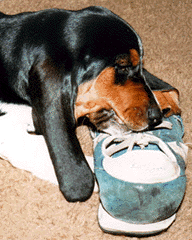
Bassets love to be with people, they are true companion dogs and were bred to be members of a pack. All dogs need many daily indoor opportunities with human company. Neglected Bassets that are kept outdoors only tend to develop temperament problems. A Basset wants and needs to be with "the pack".
When indoors, they may desire to overtake all furniture rights but this should be discouraged. Stairs, jumping on/off furniture, bed hopping and other such jarring experiences should be avoided if you want to reduce the risk of arthritis and/or back injury.
You will also want to remember that having a younger Basset in the house is like having a toddler around. They are thinking dogs, so will find things to "explore". They will also taste test whatever is available, so be careful where you put the leather shoes, remote controllers or pizza!
Most importantly, a happy Basset is one who is reminded daily that it is loved and wanted. The beauty of a Basset Hound is that it will remind you right back!
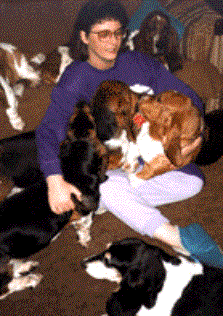
Gretchen Shelby has been a Basset owner and breeder of Logo Basset Hounds for over 17 years. She shows in conformation and obedience, and does breeding on occasion. Her hobbies include landscaping (cleaning up after the dogs), gardening (growing veggies for the dogs), dog showing (giving the dogs a road trip and a chance to eat out), crafting (rebuilding items dismantled by the dogs), collects figurines (of Bassets), and likes chatting with friends (about Bassets). She is truly "owned" by her chosen breed.
Gretchen has been an active member with Emerald
Empire Basset Hound Fanciers
having served as a club officer and board member. She has also
been active in Oregon Basset Rescue for many years, having served
in a variety of capacities. The first annual Basset Olympics (a
rescue fundraiser) was organized and chaired by her, as well as
several subsequent Olympic events.
Gretchen resides in Southern Oregon, happily
surrounded by her current pack of seven wonderful Logo 'N Basset
Hounds. gsbasset@internetcds.com
541-830-0713
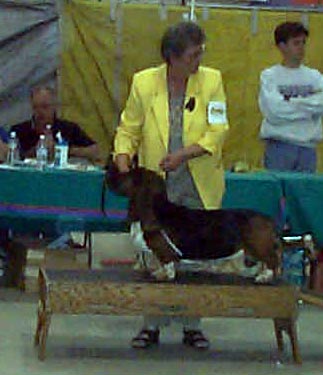 Logo Hounds: Past and Present
Logo Hounds: Past and Present
American & Canadian CH Sanlyn's Logo'N
Jeepster (Ernest)
CH Logo's Who Done It, CD (Alexis)
CH Logo's Spring Fever O Sanlyn (April)
CH Logo's Eternal Spirit (Karma)
CH Logo's Trials N Tribulations (Dusty)
CH Logo's Wind Song of Oakrydge (Mariah)
CH Logo's Tsunami of Old York (Suzie)
CH CJs Oakrydge Logo Motion (Levi)
CH Oakrydge Logo'N Dreamchaser (Chase)
CH Oakrydge Cookies N Cream (Cookie)
CH Oakridge Wrapped in Velvet (Bliss)
Bar-B Busy Body O Barking (pointed) (Busy)
Oakrydge Logo'N In Style (pointed) (Adrienne)
Oakrydge Long Distance Romance (Ruffles)
Logo's Oakrydge Indian Summer (Cheyenne)
Logo's Magic Feather Duster (Feather)
(Tillie): Our rescue basset and matriarch.
Click on the puppy
to go back to Logo Basset's Home Page